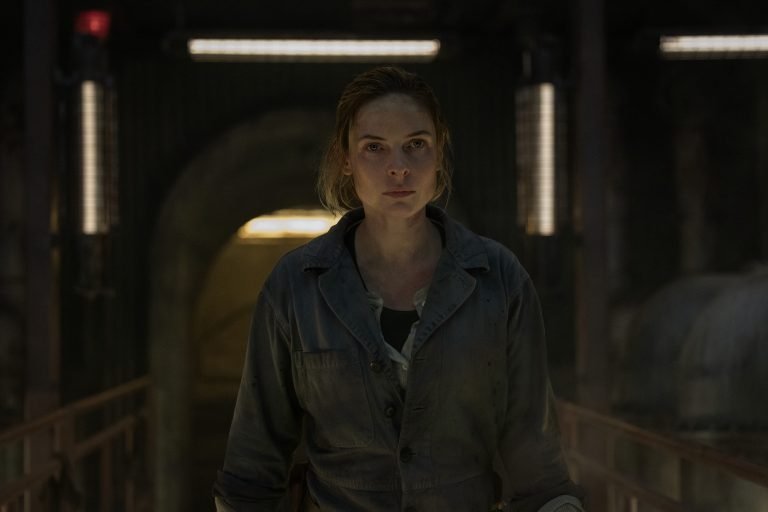90,00,000. Or, 9 million. That’s the female births that went “missing” between 2000 and 2019 owing to female-selective abortions*. To set into context, the entire Delhi had a female citizenry of less than 8 million in 2011. From the ashes of the sin that is female foeticide, we might have created a New Delhi that is new in name and ideology – a sincere attempt at Matrubhoomi.
Manish Jha’s “Matrubhoomi: A Nation Without Women” (2003) welcomes the viewers into a village that took things to an extreme. When a girl is born, she is killed right at that instant. No consent, no deliberation, simply death. The celebration bells swiftly change into cries of help and distress. Naïve babies don’t know what’s going to happen with them, and ignorant fathers don’t comprehend what they are bringing onto themselves. Only the mothers, however scarce and helpless, are able to grasp the reality of these decisions. Probably.
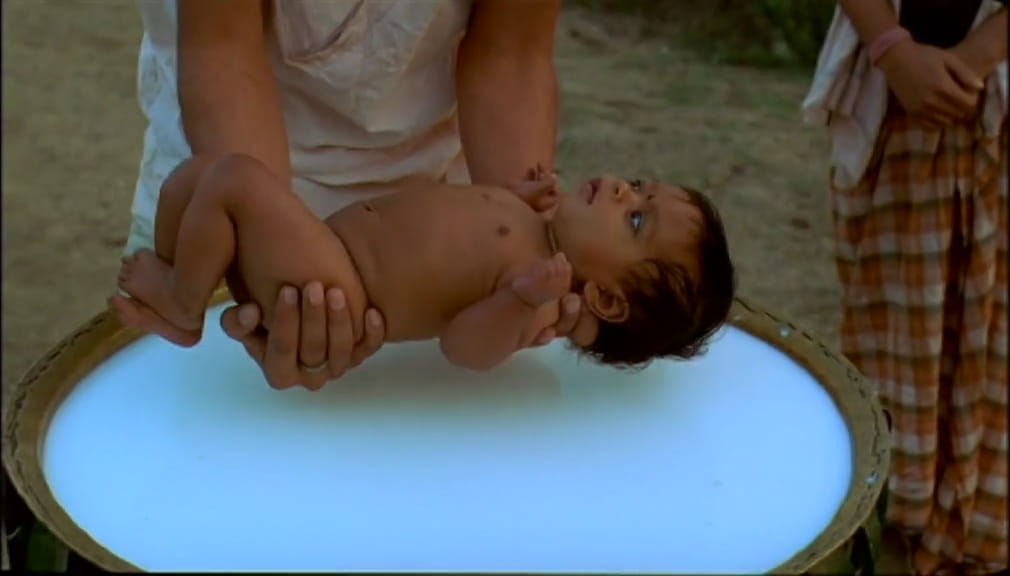
In this village, men dress as women with the sole intention of entertaining the male gaze, the only gaze present. In the absence of any woman, the village becomes an open arena of overflowing testosterone, with pornography becoming a spectator sport on broken TVs. People, no, men from all castes and classes sit in a stifling shed, shagging to a static screen, while old ones shed a tear to their teens.
The desperation to satiate the thirst with anything that moves leads to it all ending in bestiality with cows. The search for a single girl is at its peak; however, the peak has no drops. Never had. From 10-12 year old girls to 80 year old grannies, men in the village deem all of them fit for marriage and childbearing, no, boy-bearing. Fathers will probably try to scam other villagers by cross-dressing their boys for the sake of a “reverse dowry” of money and cows. Probably.
However, this village is not deprived of its little rebellions, from servants mixing piss in sharbat to a father applying his senses and preserving his girl at the edge of the village. In Kalki, a flower had bloomed in this scorching desert. Jagannath lays his eyes on her in a dense forest and decides to nab the flower for Ramcharan and his five boys. That’s when the sensible father, well, lost his senses and marries Kalki against a consideration of Rs. 5 lakhs and 5 cows, like she was an investment plan all this time.
The marriage is a clear reference to the Mahabharata, along with the names mentioned above. Each night of the week, she is forced to sleep with one of the boys and Ramcharan. With overflowing manhood, even if one of them is a cross-dresser, those men harass her. Except Sooraj, the only shining ray of hope, who treats her with tenderness and respect, and even teaches her.
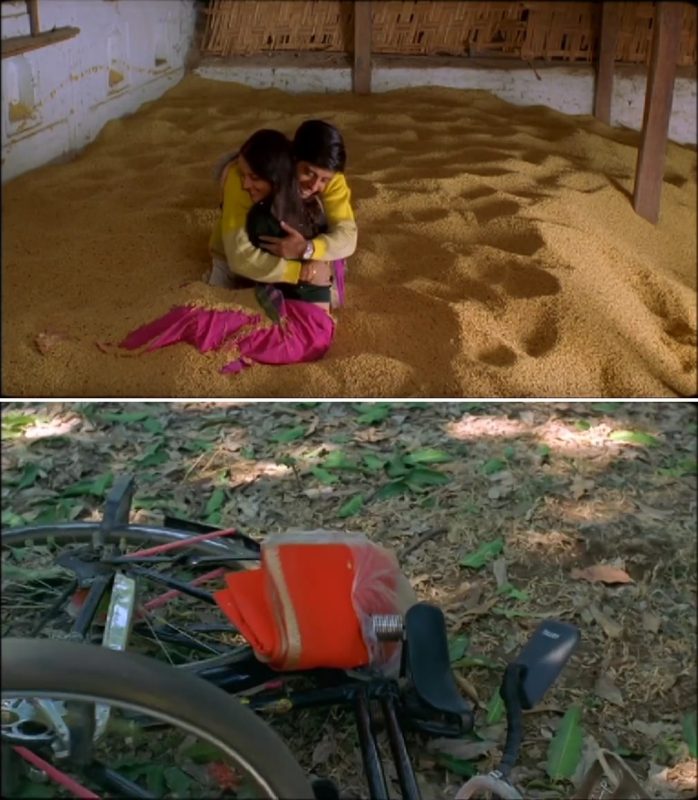
Logically, Kalki develops a preference for Sooraj, which leads to him getting killed by his bitter brothers when he brings a red saree for Kalki on his way back home. Devastated, Kalki asks her father to help her escape. However, he only wants money for the extra man who has been sleeping with Kalki. A sympathetic Dalit servant boy helps her to escape before being violently killed by the brothers, while Kalki gets chained to a post in a cowshed.
At this point, one might think, all of this is mere fantasy. Neither do we live in a village like this, nor are the boys vile. Well, not so fast. The world is having a loneliness pandemic. 55,000 people took part in the BBC’s Loneliness Experiment** and 40% of 16 to 24-year-olds who took part said they often or very often feel lonely, compared with 27% of over 75s. While 33% of people who completed the experiment said that they often or very often feel lonely, and 42% said they rarely or never feel lonely.
Apart from the research available, we can see the evidence of this everywhere. Despite promising connectivity, modern social media has created lonesome sheds of sad Homo sapiens. Some of the men are in their own little worlds, little villages that lack little women. Accordingly, online treatment of women has probably gone from bad to worse. Virality and validation have led to vility.
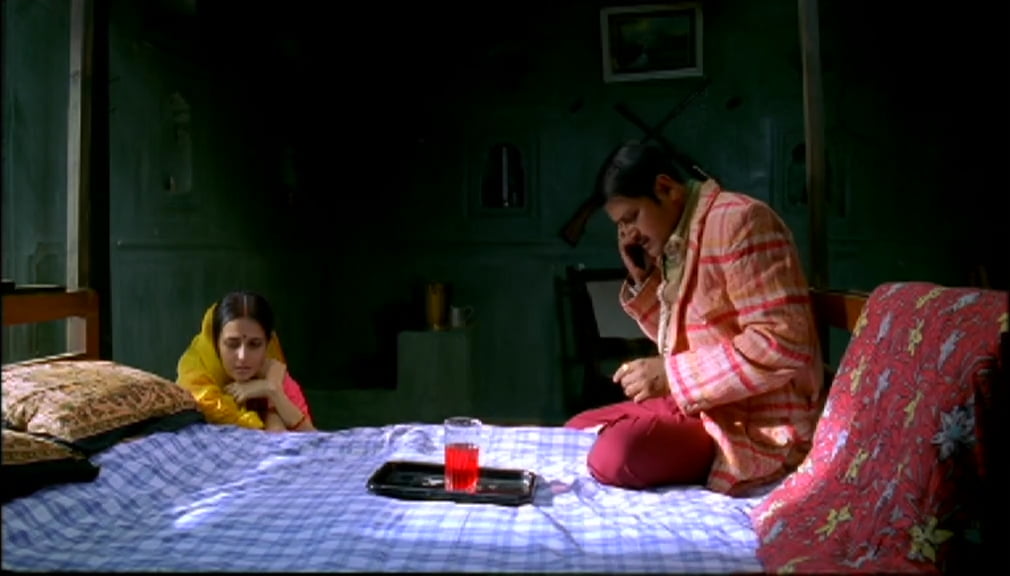
And in the village, vility led to violence. Kalki becomes a pawn in a game of revenge, in an inter-caste conflict. Misogyny doesn’t check last names on identity cards; it seeps inside the body and flows in the bloodstream. Men from the lower caste hold her responsible for the death of the servant boy and decide to avenge the killing with… gang rape. In the garb of taking revenge, men from different strata harass her.
However, if there’s one thing that rejoices patriarchy the most, it’s the news of a woman getting pregnant. Women who are otherwise treated as animals become goddesses overnight. Patriarchy doesn’t respect the woman, it respects the child inside. The child is the prize and the woman a mere vessel.
As Kalki becomes pregnant, everybody celebrates. The news spreads, and every man in the village claims paternity of the child. Jagannath declares that the newborn is going to be a boy, and Ramcharan proclaims that he is the father, for he was the first to sleep with Kalki. And the other crowd claims the child for themselves. This acts as the final spark in an already flammable village. The men kill each other off over the rights to Kalki and her child, sending the village into ashes. From the ashes, a phoenix rises as Kalki goes into labor and gives birth to a baby girl.
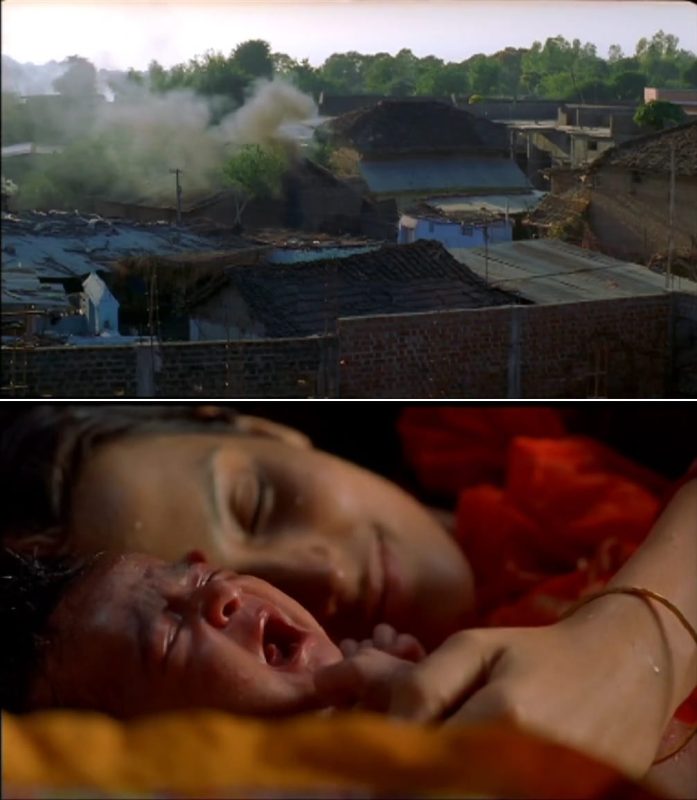
Make no mistake, the treatment of Kalki was not a first-order effect of Sooraj’s modesty or Kalki’s resilience, but rather a second-order effect of the generational eradication of women from the village.
Murakami, in his short story “Men Without Women,” writes about the absence of women from a man’s life. He writes, “I already know what it is to be the second loneliest man on earth. But I still don’t know what it is to be the loneliest. A deep gulf separates the second and the first loneliest on earth. Most likely. Deep, and wide, too. The bottom is heaped high with the corpses of birds who have tried, and failed, to traverse it. Suddenly, one day, you become Men Without Women. That day comes to you completely out of the blue, without the faintest of warnings or hints beforehand. No premonitions or foreboding, no knocks or clearing of throats. Turn a corner and you know you’re already there. But by then, there’s no going back. Once you round that bend, that is the only world you can possibly inhabit. In that world, you are called “Men Without Women.” Always a relentlessly frigid plural. Only Men Without Women can comprehend how painful, how heartbreaking, it is to become one. You lose that wonderful west wind. Fourteen is stolen away from you forever. (A billion years should count as forever.)”
It’s not only one character in one short story or one village in one movie. In the contemporary social world, Men have been distanced from women in a very strange manner. Women have been reduced to eye candy, and men have become offensive ogres. Patriarchy is promoted. Evolving incels is established. By being among women, one not only learns about the treatment of women, but also a lot more ideas.
I have known men who learnt everything from basic skills like cooking to complex emotions like empathy from females in their lives. From politics to pets, from poetry to persistence, and from periods to passion, there’s a whole lot to absorb from the mere company of women.
And all of those have been taken away from men without women, from the men of the village. Men Without Women need Little Women nearby them. All of them, Amy, Beth, Jo, and Meg. I relentlessly wish to escape the harshness of Men Without Women and a village like this.
I wish to be Sooraj in a world of Ramcharans and Jagannaths. Oh, to be Laurie cosplaying as a pirate among the March sisters! However, that’s a distant dream. Probably, it will always be. Men Without Women wish to be Laurie yet finish as Friedrich. In fact, no one’s there to call them Laurie or even Teddy. They are Mr. Theodore Lawrence, forever. It’s hard to explain what being Men Without Women feels like.
Murakami later writes, “And once you’ve become Men Without Women, loneliness seeps deep down inside your body, like a red-wine stain on a pastel carpet. No matter how many home EC books you study, getting rid of that stain isn’t easy. The stain might fade a bit over time, but it will still remain, as a stain, until the day you draw your final breath. It has the right to be a stain, the right to make the occasional, public, stain-like pronouncement. And you are left to live the rest of your life with the gradual spread of that color, with that ambiguous outline. Sounds are different in that world. So is the way you experience thirst. And the way your beard grows. And the way baristas at Starbucks treat you. Clifford Brown’s solos sound different, too. Subway-car doors close in new and unexpected ways. Walking from Omote Sando to Aoyama Itchome, you discover the distance is no longer what it once was. You might meet a new woman, but no matter how wonderful she may be (actually, the more wonderful she is, the more this holds true), from the instant you meet, you start thinking about losing her.”
Men Without Women are forever jinxed with frigid and rigid bodies. The blessing of warmth is forever snatched. The bane of being among strictness and verticality of spiky hairstyle is shoved onto these men, and the ability to feel the wind inside flowing hair is removed from their lives forever. Probably forever.
They are forever doomed to look at the world via a striking white light with no night light filters to protect the eyes. They lose sepia. And all the warmer tones with that. One no longer remains the same. It’s like “you” have been stolen from “yourself”. It’s like these men have a vowel less in their alphabet. Like the letter “u” has been snatched away forever, the way it has been removed from this piece***. It’s hard for people to notice, still, these men know how hard it is to write their own story. How hard it becomes when one becomes Men Without Women.
* according to a Pew Research Center analysis of data from the NFHS and India’s 2011 census. https://thewire.in/women/india-missing-girls-sex-ratio-infanticide-pew-analysis ** https://www.bbc.co.uk/programmes/articles/2yzhfv4DvqVp5nZyxBD8G23/who-feels-lonely-the-results-of-the-world-s-largest-loneliness-study *** Except for proper nouns and quotes





